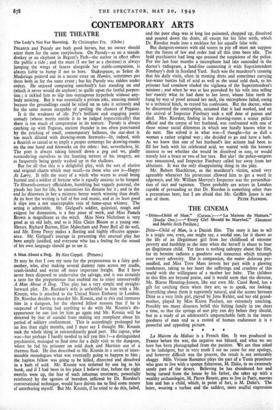CONTEMPORARY ARTS
THE THEATRE
The Lady's Not For Burning. By Christopher Fry. (Globe.) PEGASUS and Parody are both good horses, but no owner should enter them for the same steeplechase. On Parody—as on a seaside donkey or an elephant in Regent's Park—the author in effect offers the public a ride ; and the mare (I see her as a chestnut) is always jumping the wings of fences alongside her stable-companion, is always liable to bump if not to bore. Shakespeare, as Sefior de Madariaga pointed out in a recent essay on Hamlet, sometimes put them both in for the same event ; but his Parody was ridden under orders. He enjoyed comparing somebody's hair standing on end (which it never would do anyhow) to quills upon the fretful porpen- tine ; it tickled him to slip into outrageous hyperbole without any- body noticing. But it was essentially a private joke, amusing mainly because the groundlings could be relied on to take it seriously and for the same reason incapable of spoiling the chances of Pegasus.
It is the weakness of Mr. Fry's brilliant and engaging poetic comedy (whose merits entitle it to be judged hypercritically) that there is too much of compromise in its texture. Parody is always catching up with Pegasus, ancient thunder is too often punctuated by the pricking of small, contemporary balloons, the star-dust is too much diluted with drawing-room fireworks—lit, indeed, with a flourish so casual as to imply a proper contempt for drawing-rooms on the one hand and fireworks on the other : but, nevertheless' lit. The poet is always taking himself down a peg and we, gladly surrendering ourselves to the foaming torrent of his imagery, are as frequently being gently washed up in the shallows.
But for all that this is a delightful play, with the sort of elusive and original charm which may recall—to those who saw it—Happy As Larry. It tells the story of a witch who wants to avoid being burned and a soldier of fortune who is equally anxious to be hanged. To fifteenth-century officialdom, bumbling but vaguely paternal, she pleads her lust for life, he anatomises his distaste for it ; and in the end he discovers in her a mistress better worth winning than death. At its best the writing is full of fire and music, and at its least good it slips into a not unacceptable vein of home-spun whimsy. The acting is admirable. Mr. Gielgud's soldier, quizzical, rough and exigent for damnation, is a fine piece of work, and Miss Pamela Brown is magnificent as the witch. Miss Nora Nicholson is very good as an old lady, and so is Miss Claire Bloom as a young one. Messrs. Richard Burton, Eliot Makecham and Peter Bull all do well, and Mr. Esme Percy makes a fleeting and highly effective appear- ance. Mr. Gielgud's courage in presenting this unusual play has been amply justified, and everyone who has a feeling for the sound of his own language should go to see it.










































 Previous page
Previous page